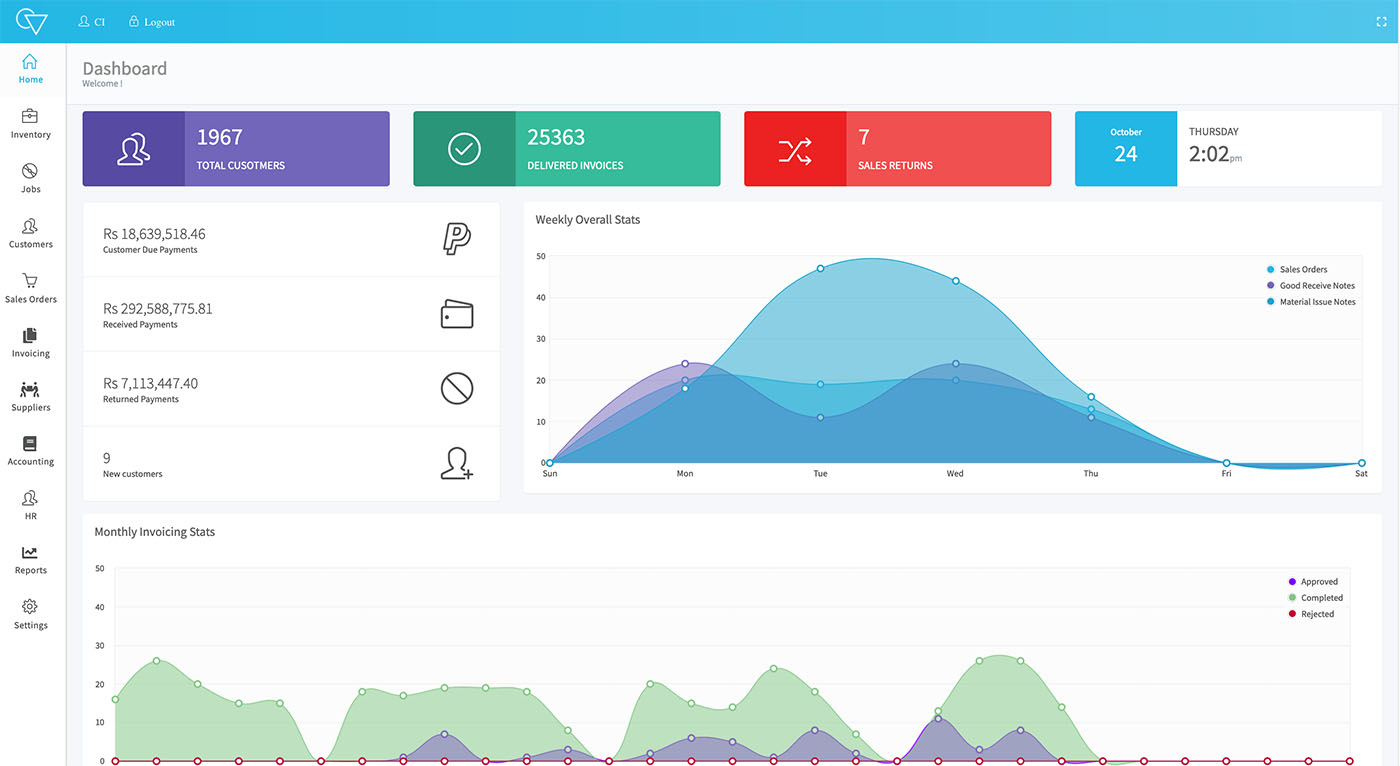Cloud-based inventory management system for small business – In the dynamic landscape of small businesses, efficient inventory management is crucial for success. Cloud-based inventory management systems have emerged as a game-changer, offering a comprehensive solution that streamlines operations, enhances accuracy, and empowers businesses to make informed decisions.
These systems leverage the power of cloud computing to provide real-time visibility into inventory levels, automate processes, and integrate seamlessly with other business applications. As a result, small businesses can gain unprecedented control over their inventory, reduce costs, and drive growth.
Key Features and Benefits

Cloud-based inventory management systems offer numerous advantages for small businesses, streamlining processes and enhancing efficiency. Here are the key features and benefits:
Core Features
- Real-time Inventory Tracking: Track inventory levels across multiple locations in real-time, ensuring accurate stock visibility.
- Automated Stock Replenishment: Set reorder points to automatically trigger purchase orders when stock falls below a certain level, preventing stockouts.
- Product Categorization and Attributes: Organize inventory by categories, attributes, and custom fields, allowing for easy product search and management.
- Inventory Valuation: Track inventory value using various costing methods (FIFO, LIFO, etc.), providing accurate financial reporting.
- Barcode and RFID Integration: Integrate with barcode scanners and RFID technology for efficient inventory counting and tracking.
Advantages of Cloud-Based Systems
- Accessibility: Access inventory data from anywhere with an internet connection, enabling remote management and collaboration.
- Scalability: Easily scale the system to accommodate business growth without the need for additional hardware or infrastructure.
- Data Security: Cloud-based systems provide secure data storage and backup, ensuring data protection and business continuity.
- Cost-effectiveness: Eliminate the need for expensive on-premise servers and IT maintenance, reducing overall costs.
- Improved Collaboration: Share inventory data with multiple users and departments, fostering better communication and decision-making.
System Functionality
Cloud-based inventory management systems provide a comprehensive suite of functionalities to streamline inventory operations for small businesses. These systems leverage cloud computing to offer real-time visibility, automated processes, and data-driven insights.
At the core of these systems is the ability to track inventory levels accurately. The system monitors stock movements in real-time, recording additions, deductions, and adjustments. This information is then used to maintain an up-to-date inventory database, ensuring that businesses have a clear understanding of their stock levels at any given time.
Inventory Tracking
- Real-time inventory monitoring, providing up-to-date stock levels.
- Automatic tracking of stock movements, including additions, deductions, and adjustments.
- Centralized inventory database for a comprehensive view of all stock items.
Stock Management
Cloud-based inventory management systems facilitate efficient stock management processes. The system allows businesses to set reorder points, receive notifications for low stock levels, and generate purchase orders automatically. This automation reduces the risk of stockouts and ensures that businesses maintain optimal inventory levels.
- Automated reorder point generation to prevent stockouts.
- Low stock notifications to trigger timely replenishment.
- Automatic purchase order generation for seamless procurement.
Reporting and Analytics
These systems provide robust reporting and analytics capabilities, enabling businesses to gain valuable insights into their inventory performance. Reports can be generated on various metrics, such as stock levels, turnover rates, and sales trends. This data can be used to identify areas for improvement, optimize inventory strategies, and make informed decisions.
- Comprehensive inventory reports for detailed analysis.
- Turnover rate analysis to identify slow-moving and fast-moving items.
- Sales trend analysis to forecast demand and plan inventory levels.
Integration and Compatibility
Integrating a cloud-based inventory management system with other business applications is essential for streamlined operations. It enhances data accuracy, reduces errors, and optimizes workflows.
By seamlessly connecting with accounting software, the system ensures accurate inventory valuation and automatic updates of financial records. Integration with e-commerce platforms allows real-time inventory updates, eliminating overselling and improving customer satisfaction. Additionally, CRM systems integration provides valuable insights into customer purchase patterns, enabling targeted marketing campaigns.
Integration with Accounting Software
- Automatic updates of inventory balances and transactions in accounting records
- Eliminates manual data entry and reduces errors
- Provides a comprehensive view of financial performance
Security and Data Protection: Cloud-based Inventory Management System For Small Business
A cloud-based inventory management system prioritizes data security and protection. It employs robust measures to safeguard sensitive information from unauthorized access, cyber threats, and data breaches.
The system leverages advanced encryption protocols to protect data both in transit and at rest, ensuring its confidentiality and integrity. Additionally, multi-factor authentication mechanisms prevent unauthorized login attempts and data tampering.
Data Backup and Recovery
Recognizing the critical nature of data, the system implements comprehensive backup and recovery procedures. Regular backups are performed to create redundant copies of data, ensuring its availability even in the event of hardware failure or data corruption.
In case of a disaster or data loss, the system’s recovery mechanisms enable swift restoration of data from secure backups. This minimizes downtime and ensures business continuity, allowing seamless operations to resume.
Implementation and User Experience
Implementing a cloud-based inventory management system involves a streamlined process to ensure seamless integration and a positive user experience.
The implementation process typically encompasses the following steps:
Data Migration
Migrating data from legacy systems or spreadsheets to the cloud-based platform is crucial. This process requires careful planning, data mapping, and validation to ensure accuracy and minimize disruptions.
User Training
Comprehensive user training is essential to empower employees with the knowledge and skills to effectively utilize the system. Training should cover core functionalities, navigation, reporting, and troubleshooting.
System Configuration
System configuration involves customizing the software to align with specific business requirements. This includes setting up user roles, defining inventory categories, and configuring automated workflows.
User-Friendly Design and Intuitive Navigation
A user-friendly design and intuitive navigation are paramount for enhancing the user experience. The interface should be visually appealing, easy to understand, and responsive to user actions. This ensures efficient inventory management and minimizes the learning curve.
Cost and Pricing Models
Cloud-based inventory management systems offer various pricing models tailored to the specific needs and budget of small businesses. Understanding the factors that influence pricing and choosing the most cost-effective plan can help businesses optimize their investment.
Pricing models typically vary based on factors such as the number of users, storage capacity, and the features included in the system. Some systems may offer tiered pricing plans, with higher tiers providing access to additional features or increased storage capacity.
Factors Influencing Pricing
- Number of Users: The number of users who will have access to the system can impact the pricing. Some systems charge a per-user fee, while others offer unlimited user access within a specific tier.
- Storage Capacity: The amount of storage space required for inventory data and related documents can influence the pricing. Systems may offer different storage tiers with varying capacities and costs.
- Features Included: The range of features offered by the system, such as advanced reporting, inventory optimization tools, and integrations with other business applications, can also affect the pricing.
Choosing the Most Cost-Effective Plan
To choose the most cost-effective pricing plan for a small business, consider the following tips:
- Assess Current and Future Needs: Determine the current inventory management needs and anticipate future growth. This will help identify the appropriate storage capacity and features required.
- Compare Pricing Models: Research different cloud-based inventory management systems and compare their pricing models. Consider the number of users, storage capacity, and features included in each plan.
- Negotiate with Vendors: If possible, negotiate with vendors to secure a customized pricing plan that meets specific business requirements and budget constraints.
- Consider Long-Term Value: Evaluate the long-term value of the system beyond its immediate cost. Features such as scalability, integrations, and support can contribute to overall business efficiency and profitability.
Case Studies and Success Stories

Numerous small businesses have experienced significant improvements in their inventory management practices after implementing a cloud-based inventory management system. These success stories provide valuable insights into the challenges faced by small businesses, the solutions they found, and the tangible benefits they achieved.
By showcasing real-world examples, we aim to demonstrate the positive impact of cloud-based inventory management systems on small businesses and encourage their adoption.
Small Business A: Enhanced Inventory Accuracy and Reduced Shrinkage
Small Business A, a retail store specializing in electronics, struggled with inventory inaccuracies and high shrinkage rates. After implementing a cloud-based inventory management system, they experienced a 25% reduction in shrinkage and a significant improvement in inventory accuracy, leading to increased profitability.
Small Business B: Improved Efficiency and Reduced Labor Costs
Small Business B, a manufacturing company, faced challenges with manual inventory tracking, resulting in inefficiencies and high labor costs. By implementing a cloud-based inventory management system, they automated their inventory processes, reduced labor costs by 20%, and improved overall efficiency.
Small Business C: Enhanced Customer Satisfaction and Increased Sales, Cloud-based inventory management system for small business
Small Business C, an online retailer, struggled to keep up with demand and provide accurate product availability information to customers. After implementing a cloud-based inventory management system, they improved customer satisfaction by 15% and increased sales by 10% due to improved inventory visibility and availability.
Closing Notes

By embracing cloud-based inventory management systems, small businesses can unlock a world of possibilities. From improved inventory accuracy and reduced costs to enhanced decision-making and increased efficiency, these systems are transforming the way businesses manage their inventory. As technology continues to evolve, cloud-based inventory management systems will undoubtedly remain a cornerstone of success for small businesses looking to thrive in the modern marketplace.
Detailed FAQs
What are the key benefits of using a cloud-based inventory management system for small businesses?
Cloud-based inventory management systems offer numerous benefits for small businesses, including real-time inventory visibility, automated processes, improved accuracy, reduced costs, and enhanced decision-making.
How does a cloud-based inventory management system integrate with other business applications?
Cloud-based inventory management systems can integrate with various business applications, such as accounting software, e-commerce platforms, and CRM systems, enabling seamless data flow and streamlined workflows.
What security measures are in place to protect data in a cloud-based inventory management system?
Cloud-based inventory management systems implement robust security measures, including data encryption, access controls, and regular security audits, to protect sensitive data from unauthorized access and cyber threats.